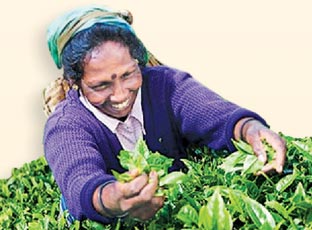Go-slow causes extensive losses to tea companies
The ‘go slow’ campaign launched last Monday by tea estate workers
demanding a reasonable wage hike has caused extensive loss to tea
companies which have shut down operations.
 Estate workers launched trade union action demanding a daily wage of
Rs. 1,000 which plantation companies have so far refused to agree to
owing to the losses they incur due to the rise in cost of production and
the drastic drop in tea and rubber prices. Estate workers launched trade union action demanding a daily wage of
Rs. 1,000 which plantation companies have so far refused to agree to
owing to the losses they incur due to the rise in cost of production and
the drastic drop in tea and rubber prices.
Secretary General, Planters’ Association of Ceylon (PA), Malin
Goonetileke said there were acts of disruption and violence in certain
estates. He said tea leaves were dumped in the bungalow of the manager
of the Hapugastenne Estate in Ratnapura and items in his sitting room
were damaged. “A large number of up and low country factories have been
closed,” Goonetileke said. Trade Union officials said they will continue
the campaign till the demand is met.
Negotiations have reached a deadlock with both parties refusing to
comply. The slow work continued throughout the week forcing
manufacturers to shut down factories. The output of an eight-hour work
day has been reduced to three to five kilograms of plucked tea as a
result of the go-slow campaign. The daily wage of a worker is Rs. 485.
The average quantity of tea plucked by a worker per day is 18 kilograms
which is low compared to Kenya where it is around 48 kgs and India 38
kgs.
Regional Plantation Companies (RPCs) shot down the demand for higher
wages for workers by trade unions and proposed a productivity-based wage
increase.
At a media briefing last week, PA officials said RPCs cannot fulfill
the demand of estate workers given the current drop in tea and rubber
prices triggered by the crisis in the Middle East and Russia, the two
markets to which Sri Lanka exports a large volume of tea. “We proposed a
reasonable wage hike by which a large number of workers will earn much
more than what they earn now,” Goonetileke said.He said the cost of
production increases by 52 cents a kilo when the wages are increased by
one rupee. Our earnings on a kilogram of tea has dropped by Rs. 100 this
year. While the wage of a worker was increased several times, prices
have gone up only on few occasions. The collective agreement on wage
revision is made once in two years. The plantation sector was privatised
in 1992 to revive the sector. However the expected pace of growth in
profits has not taken place.
-LF
|

